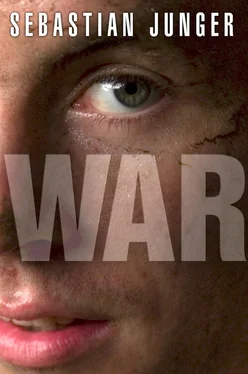One of the most puzzling things about fear is that it is only loosely related to the level of danger. During World War II, several airborne units that experienced some of the fiercest fighting of the war also reported some of the lowest psychiatric casualty rates in the U.S. military. Combat units typically suffer one psychiatric casualty for every physical one, and during Israel’s Yom Kippur War of 1973, frontline casualty rates were roughly consistent with that ratio. But Israeli logistics units, which were subject to far less danger, suffered three psychiatric cases for every physical one. And even frontline troops showed enormous variation in their rate of psychological breakdown. Because many Israeli officers literally led from the front, they were four times more likely to be killed or wounded than their men were — and yet they suffered one-fifth the rate of psychological collapse. The primary factor determining breakdown in combat does not appear to be the objective level of danger so much as the feeling — even the illusion — of control. Highly trained men in extraordinarily dangerous circumstances are less likely to break down than untrained men in little danger.
The division between those who feel in control of their fate and those who don’t can occur even within the same close-knit group. During World War II, British and American bomber crews experienced casualty rates as high as 70 percent over the course of their tour; they effectively flew missions until they were killed. On those planes, pilots reported experiencing less fear than their turret gunners, who were crucial to operations but had no direct control over the aircraft. Fighter pilots, who suffered casualty rates almost as high as bomber crews, nevertheless reported extremely low levels of fear. They were both highly trained and entirely in control of their own fate, and that allowed them to ignore the statistical reality that they had only a fifty-fifty chance of surviving their tour.
Among men who are dependent on one another for their safety — all combat soldiers, essentially — there is often an unspoken agreement to stick together no matter what. The reassurance that you will never be abandoned seems to help men act in ways that serve the whole unit rather than just themselves. Sometimes, however, it effectively amounts to a suicide pact. During the air war of 1944, a four-man combat crew on a B-17 bomber took a vow to never abandon one another no matter how desperate the situation. (A fifth team member, the top turret gunner, was not part of the pact.) The aircraft was hit by flak during a mission and went into a terminal dive, and the pilot ordered everyone to bail out. The top turret gunner obeyed the order, but the ball turret gunner discovered that a piece of flak had jammed his turret and he could not get out. The other three men in his pact could have bailed out with parachutes, but they stayed with him until the plane hit the ground and exploded. They all died.
One of the Taliban fighters falls to the ground, dead, and the other releases Brennan and escapes downhill through the trees. Giunta jams a new magazine into his gun and yells for a medic. Brennan is lying badly wounded in the open and Giunta grabs him by the vest and drags him behind a little bit of cover. He cuts the ammo rack off his chest and pulls the rip cord on his ballistic vest to extricate him from that and then cuts his clothing off to look for wounds. Brennan’s been hit multiple times in the legs and has a huge shrapnel wound in his side and has been shot in the lower half of his face. He’s still conscious and keeps complaining that there’s something in his mouth. It’s his teeth, though Giunta doesn’t tell him that.
The B-1 flying overhead drops two bombs on Hill 1705, and that stuns the enemy enough that the Americans are able to consolidate their position. The Third Platoon medic arrives and gives Brennan a tracheotomy so he can breathe better, and then they get him ready for the MEDEVAC. A Spectre gunship and a couple of Apaches are finally able to distinguish Americans from the enemy and start lighting up the hillsides with cannon and gunfire, and half an hour later the MEDEVAC comes in and they start hoisting casualties off the ridge. When they’re done, the rest of First Platoon shoulder their gear and resume walking home.
“We waited for First Platoon for hours,” Hijar told me about that night, “and once we linked up with them it was still two and a half hours’ walk back to the KOP. You could just tell on the guys’ faces, it wasn’t the right time to ask. You already knew what the answer was going to be. Some of them were walking around with bullet holes in their helmets.”
Brennan doesn’t survive surgery. Mendoza is dead before he even leaves the ridge. Five more men are wounded. Then there’s Rougle from the day before, as well as Rice and Vandenberge. It’s been a costly week. It’s been the kind of week that makes people back home think that maybe we’re losing the war.
O’BYRNE MISSED ROCK AVALANCHE BECAUSE HIS younger sister, Courtney, had been badly burned in a house fire and he rushed home to be with her. He left the Korengal with the understanding that she would probably not survive. He arrived in Syracuse, New York, and found the rest of his family in the hospital waiting room. He said he wanted to see her alone and then walked into her room and sat down by her bed. Courtney was semiconscious and had a tube down her throat and was hooked up to a respirator that had swelled her belly with air. The sight was too much for O’Byrne, and he broke down and started crying. He squeezed her hand and said, ‘Courtney, I love you, squeeze my hand if you can hear me.’ And she squeezed his hand back. And he said, ‘Squeeze my hand three times if you love me back,’ and she squeezed his hand once, twice, three times.
Her lungs were badly damaged by the fire and the doctors told the family that if she didn’t improve by a certain date she was almost certainly going to die. O’Byrne visited her in the hospital every day and tried to let the days tick by without going crazy. It was during that awful time that he got a call from a friend that something bad had happened on Rock Avalanche. It took some digging but he finally found out that Rougle, Brennan, and Mendoza were dead. Courtney was being treated at the VA hospital at the University of Syracuse, and he wandered around campus until he found a bar and then he sat down and started drinking. Someone asked him why he was getting drunk and he said, ‘I have a few friends who need a drink,’ and then he drank a pitcher of beer for each man who had died.
He headed back to the Korengal about a week later. Courtney was out of immediate danger, but it tormented O’Byrne that if he got killed, her last memory of him would be from a hospital bed. He passed through New York, and on a whim he called me from a bar where he was having dinner with two friends. It was strange to see him in civilian clothes and without a gun, and when I walked up he stood and shook my hand and then gave me a hug. He was wearing a blue T-shirt and a blue ghetto-style cap sideways and couldn’t focus his eyes.
“My boys got messed up,” he said. “Brennan got killed. Rougle got killed.”
We sat down and he asked me to tell him everything. All he knew were the names of the dead, and I asked him what kind of detail he wanted this in.
“Everything,” O’Byrne said. “Tell me everything you know.”
O’Byrne was most of the way through a bottle of red wine and his friends were drinking beers and shots of tequila. I apologized to them for taking the conversation back to the war and they said please, go ahead, and I told O’Byrne about how the enemy had opened up from one ridgeline and then snuck up another side and overran the hilltop. I told him about Rice and Vandenberge and how First Platoon had walked straight into an ambush on the Gatigal spur. It took O’Byrne a while to absorb this.
Читать дальше
Конец ознакомительного отрывка
Купить книгу












